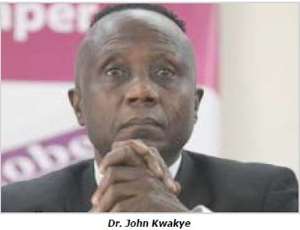
Dr. John Kwakye, Senior Economist of the Institute of Economic Affairs (IEA), has cautioned the Bank of Ghana (BoG) to reduce its financial support to government.
That, he said, was necessary to reduce its adverse effects on the country's economy.
Dr. Kwakye, who was speaking in an interview with the media, said BoG's excessive financing of the deficit undermines monetary policy, fuels inflation, devalues the cedi and prevents the much-needed fiscal consolidation.
He said BoG faces a policy dilemma of bolstering its reserves of the cedi, stating that the BoG would have to continue to review its regulatory measures so as to boost forex flows into the economy, especially via formal channels.
Dr. Kwakye said, 'The bottom-line is that the cedi's persisting weakness reflects the economy's underlying weak structure and weak fundamentals, essentially the weak 'colonial structure' and weak fiscal discipline.'
He said arresting the cedi's decline on a durable basis requires fundamentally transforming the economy by diversifying and adding value to exports and promoting domestic industrialization in order to reduce import demand and entrenching fiscal discipline.
The senior economist stressed the need for government to reduce borrowing in order to reduce interest costs and to implement a debt-restructuring strategy to reduce immediate debt-servicing pressures on the budget.
He said government must phase out universal subsidies and strengthen social intervention programmes targeted at the poor, noting that the universal subsidies only benefit the rich.
Dr. Kwakye urged government to reduce recurrent spending as a whole to create room for higher capital spending in order to boost growth.
Inflation target
Expressing his view on the state of the economy and the outlook following the Minister of Finance's presentation of the 2014 mid-year review of the economy to Parliament, he said inflation target had been revised upwards by the Minister from 9 to 13 per cent.
He said, 'It is unfortunate that the country seems to be validating high inflation instead of trying to rein it in.'
Dr. Kwakye said the upward revision recognizes the reality because inflation in June had reached 15 percent and achieving the new higher target would still be challenging and would depend on how the driving forces such as erratic energy supply and high cost of utilities fuel and utility price adjustments, cedi depreciation, food inflation and fiscally-induced demand pressures evolve.
Dr. Kwakye said that in order to tame inflation on a durable basis, we need to address these driving forces and in particular close the demand-supply gaps in the economy.
He said Ghana's exchange rate is potentially vulnerable to delayed donor disbursements, slowing private capital inflows, still-high import demand and high inflation.
Dr. Kwakye said there could be some temporary respite from expected receipts from the syndicated cocoa loan and bond issue.
By Cephas Larbi
[email protected]
Pix saved in newdaily as Kwakye




 Dumsor: Don't rush to demand timetable; the problem may be temporary — Atik Moha...
Dumsor: Don't rush to demand timetable; the problem may be temporary — Atik Moha...
 Space X Starlink’s satellite broadband approved in Ghana — NCA
Space X Starlink’s satellite broadband approved in Ghana — NCA
 2024 election will be decided on the grounds of the economy; choice of running m...
2024 election will be decided on the grounds of the economy; choice of running m...
 Dumsor: We're demanding less; just give us a timetable — Kwesi Pratt to ECG
Dumsor: We're demanding less; just give us a timetable — Kwesi Pratt to ECG
 Do I have to apologise for doing my security work, I won’t – Simon Osei-Mensah r...
Do I have to apologise for doing my security work, I won’t – Simon Osei-Mensah r...
 All my businesses have collapsed under Akufo-Addo — NDC Central regional chair
All my businesses have collapsed under Akufo-Addo — NDC Central regional chair
 Military, Prison Officers clash in Bawku, three injured
Military, Prison Officers clash in Bawku, three injured
 GRA-SML contract: MFWA files RTI request demanding KPMG report
GRA-SML contract: MFWA files RTI request demanding KPMG report
 Court threatens to call second accused to testify if NDC's Ofosu Ampofo fails to...
Court threatens to call second accused to testify if NDC's Ofosu Ampofo fails to...
 Family accuses hospital of medical negligence, extortion in death of 17-year-old...
Family accuses hospital of medical negligence, extortion in death of 17-year-old...
